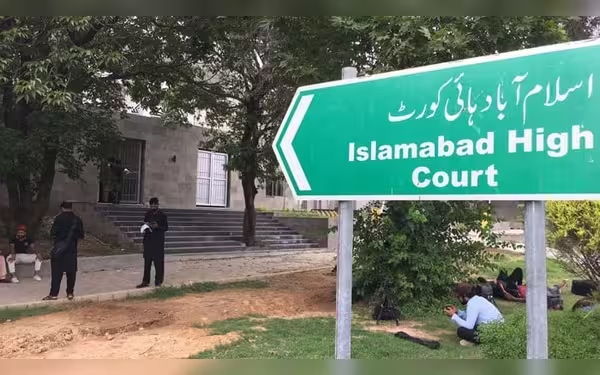Sunday, November 24, 2024 08:45 AM
IHC Bars PTI From Protesting in Islamabad Under New Assembly Law
- IHC prohibits PTI's protest citing assembly law violations.
- Committee to engage with PTI leadership formed by court.
- Public order emphasized amid upcoming Belarus president's visit.
 Image Credits: geo
Image Credits: geoIHC prohibits PTI from protesting in Islamabad, citing violations of the peaceful assembly law and emphasizing public order.
On November 21, 2024, the Islamabad High Court (IHC) made a significant ruling regarding the Pakistan Tehreek-e-Insaf (PTI) party's planned protest in the capital. The court has instructed authorities not to permit PTI to hold its "do-or-die" protest, citing violations of the newly enacted peaceful assembly law. This decision came after a petition was filed by Advocate Rizwan Abbasi, representing a trader association president, highlighting the disruptions caused by political activities in Islamabad.
During the court proceedings, Interior Minister Mohsin Naqvi was summoned to provide insights into the situation. The Chief Justice of the IHC, Aamer Farooq, emphasized the importance of maintaining public order and the rights of citizens to move freely without hindrance. The court noted that while the Constitution guarantees the right to peaceful assembly, this right is not absolute and can be subject to reasonable restrictions.
The IHC's ruling referenced a previous decision from October 5, where the court had directed local authorities to designate a specific area for PTI's demonstrations. This was aimed at preventing any unlawful protests that could disrupt peace, especially during significant events like the SCO summit. Justice Farooq reiterated that it is the responsibility of the Ministry of Interior and the Islamabad administration to ensure law and order.
In today's verdict, the court mandated the formation of a committee, preferably led by the Interior Minister, to engage with PTI leadership. This committee is expected to address the sensitivities surrounding the planned protest, particularly due to the upcoming visit of the Belarus president. The court also pointed out that no formal request had been made by PTI to seek permission for their assembly, which is a crucial step in the legal process.
Justice Farooq made it clear that if there is no progress in discussions between the government and PTI, the authorities must ensure that the law is upheld without infringing on the rights of ordinary citizens. The court's directive prohibits any protests, rallies, or sit-ins that do not comply with the established assembly laws in Islamabad.
As the situation unfolds, the federal government is preparing for PTI's anticipated protest, with plans to seal off the capital. Meanwhile, PTI is mobilizing its supporters for a large turnout. The call for this protest was notably made by Imran Khan, the party's founder, who has been imprisoned since August last year. He urged supporters to rally against alleged electoral rigging and the arrests of party members.
This ruling by the IHC underscores the delicate balance between the right to protest and the need for public order. As citizens, it is essential to understand the implications of such legal decisions on our rights and freedoms. The upcoming hearing on November 27 will be crucial in determining the next steps for both the government and PTI, as they navigate this complex political landscape.













